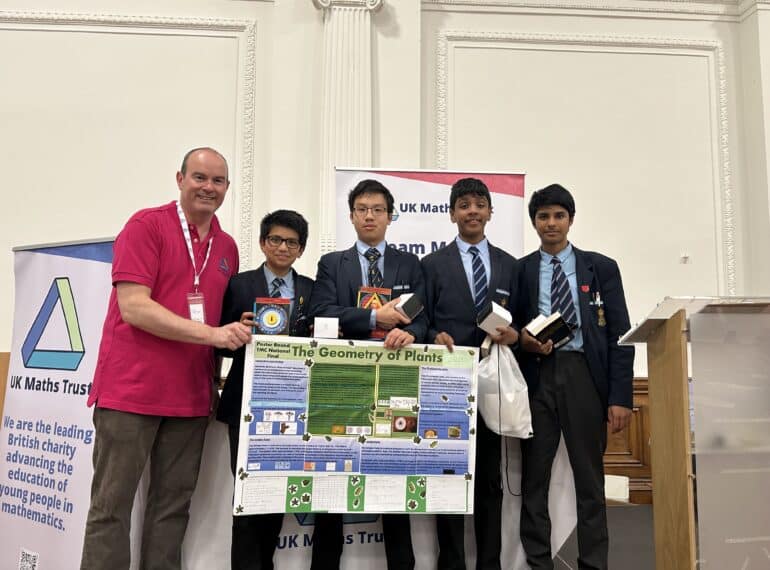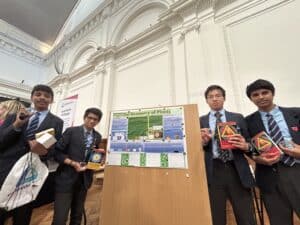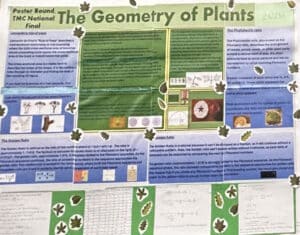
Sixth-formers Karan Somani and Samrath Sareen have won the FT’s Schools Champion Award after stirring up huge interest in the news organisation’s work among their fellow pupils.
 Having been selected for the FT Student Advocate Programme, the pair threw themselves into the role, securing 94 sign-ups from other QE boys keen to read the FT and find out more about its work. This figure was the highest for any school worldwide.
Having been selected for the FT Student Advocate Programme, the pair threw themselves into the role, securing 94 sign-ups from other QE boys keen to read the FT and find out more about its work. This figure was the highest for any school worldwide.
Head of Economics Krishna Shah said: “Karan and Samrath are to be congratulated on the great commitment they showed to the FT programme. I know they have benefitted significantly from all that it has to offer.”
The Student Advocate Programme gives up to three pupils from each participating school the opportunity to develop ideas on how the FT can better engage with young people and to raise awareness of the benefits of reading it.
Karan praised the programme: “As a student with a great passion for economics, it’s been helpful to learn more about stylistic writing and the technique to create informative content at the highest levels.
“The interactive webinars and sessions with members of the editorial team have been a great way to expand my knowledge around current affairs and the general economic state of the country.”
 As part of their involvement, Karan and Samrath gave a talk to the Gresham Society (QE’s Economics society), in which they critically analysed the impacts of the most recent decisions of the Bank of England’s Monetary Policy Committee (MPC) on the economy. Another focus of attention was the economic policy of President Trump.
As part of their involvement, Karan and Samrath gave a talk to the Gresham Society (QE’s Economics society), in which they critically analysed the impacts of the most recent decisions of the Bank of England’s Monetary Policy Committee (MPC) on the economy. Another focus of attention was the economic policy of President Trump.
“The presentation at the Gresham Society was a great success, and it was very interesting to hear different opinions about Trumpian politics and its impacts on the politics and trade relations across the world,” said Karan.
During the programme, the pair were set a series of tasks. These, said Samrath, “allowed us to deepen our understanding and interest of key economic and financial principles, such as the large-scale impact AI is currently having on the economy”.
Samrath added: “It was great to see how many students in our School regularly read the FT to aid and enhance their studies. My favourite part of this programme was interacting with like-minded students from around the world.”
The pair won a £50 gift voucher and a certificate as their prize for winning the award.
 As part of the School’s involvement with the FT, its Head of Visual and Data Journalism, Alan Smith, came in to give a lecture earlier this year.
As part of the School’s involvement with the FT, its Head of Visual and Data Journalism, Alan Smith, came in to give a lecture earlier this year.
He recounted to the boys his own educational journey. He had pursued A-levels and higher education when that was not the norm for those from his background, and he also seized an opportunity to study abroad, thereby gaining skills which he would not otherwise have learned.
Ahsan Rahman, of Year 11, said: “We heard about how technology and different forms of data analysis have helped Alan within his articles to display very complex information in a digestible form for their readers.”
Eesa Bhaijee, also of Year 11, added: “Alan stretched the boundaries of data presentation through his sonification [use of non-speech audio] of the US yield curve, making it accessible to a wider range of audiences, including the visually impaired community.”
Both Eesa and Ahsan were especially impressed by the work Alan and the FT team had done to bring to life the Moniac (Monetary National Income Analogue Computer). Designed as a teaching device, this was created in 1949 by London School of Economics (LSE) student Bill Phillips, using water to show how money flows around an economy. At least 12 were built.
In collaboration with Cambridge University, home of one of the last working original Moniacs, an FT project team created the FT Money Machine, which bridges the gap between the Moniac’s historical analogue computing and modern digital learning, using the Apple Vision Pro headset to blend digital content with the physical world.
It was, said Eesa, simply “mind-blowing”.

 The four, who were competing against 71 other teams, took second place overall in the final, held at the Royal Horticultural Halls in central London.
The four, who were competing against 71 other teams, took second place overall in the final, held at the Royal Horticultural Halls in central London. The event consisted of five demanding rounds: the Group Circus, Shuttle, Crossnumber, Relay, and Poster rounds. The rounds are designed to test mathematical thinking, teamwork and resilience.
The event consisted of five demanding rounds: the Group Circus, Shuttle, Crossnumber, Relay, and Poster rounds. The rounds are designed to test mathematical thinking, teamwork and resilience.

 Harik progressed through three rounds of the UK’s top schools Physics competition and has now been chosen for the five-person UK team after performing well among some 14 high-fliers at a selection camp (pictured).
Harik progressed through three rounds of the UK’s top schools Physics competition and has now been chosen for the five-person UK team after performing well among some 14 high-fliers at a selection camp (pictured). Harik’s invitation to the UK BPhO training and selection camp in Oxford (pictured) followed on the basis of his performance in Round 1 and 2.
Harik’s invitation to the UK BPhO training and selection camp in Oxford (pictured) followed on the basis of his performance in Round 1 and 2.

 Year 12 pupil Keon Robert’s profile thus demonstrates how apt it is that the magazine carries the name of this claimant to the throne (pictured here), who died in the Tower of London in 1615 at the age of just 39.
Year 12 pupil Keon Robert’s profile thus demonstrates how apt it is that the magazine carries the name of this claimant to the throne (pictured here), who died in the Tower of London in 1615 at the age of just 39. The magazine includes colourful artworks supplied by the Art department, as well as poetry and articles on Politics, Science, Classics and Modern Foreign Languages. The Languages section includes boys’ entries to the national Anthea Bell Translation Competition.
The magazine includes colourful artworks supplied by the Art department, as well as poetry and articles on Politics, Science, Classics and Modern Foreign Languages. The Languages section includes boys’ entries to the national Anthea Bell Translation Competition. What will be left of the Conservatives? Poem by Ishaan Uplanchi, Year 7
What will be left of the Conservatives? Poem by Ishaan Uplanchi, Year 7 The 63 pages of the online magazine are interspersed with artworks in a wide variety of styles by pupils drawn from year groups throughout the School.
The 63 pages of the online magazine are interspersed with artworks in a wide variety of styles by pupils drawn from year groups throughout the School.

 Having been selected for the FT Student Advocate Programme, the pair threw themselves into the role, securing 94 sign-ups from other QE boys keen to read the FT and find out more about its work. This figure was the highest for any school worldwide.
Having been selected for the FT Student Advocate Programme, the pair threw themselves into the role, securing 94 sign-ups from other QE boys keen to read the FT and find out more about its work. This figure was the highest for any school worldwide. As part of their involvement, Karan and Samrath gave a talk to the Gresham Society (QE’s Economics society), in which they critically analysed the impacts of the most recent decisions of the Bank of England’s Monetary Policy Committee (MPC) on the economy. Another focus of attention was the economic policy of President Trump.
As part of their involvement, Karan and Samrath gave a talk to the Gresham Society (QE’s Economics society), in which they critically analysed the impacts of the most recent decisions of the Bank of England’s Monetary Policy Committee (MPC) on the economy. Another focus of attention was the economic policy of President Trump. As part of the School’s involvement with the FT, its Head of Visual and Data Journalism, Alan Smith, came in to give a lecture earlier this year.
As part of the School’s involvement with the FT, its Head of Visual and Data Journalism, Alan Smith, came in to give a lecture earlier this year.